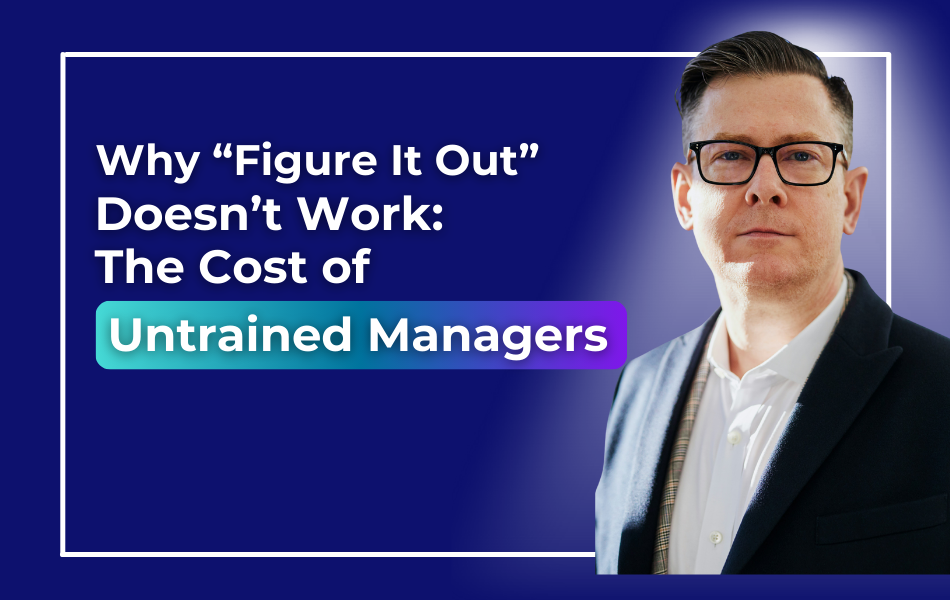
250. Why “Figure It Out” Doesn’t Work: The Cost of Untrained Managers
Why “Figure It Out” Doesn’t Work: The Cost of Untrained Managers
About this Episode
Ep. 250 -Remember your first time leading a team? That mix of excitement and uncertainty, wondering if you’re making the right calls. For most of us, it meant long hours, unclear expectations, and a whole lot of trial and error.
In this episode, Ramona Shaw shares how this common “figure it out” approach to leadership development creates ripple effects that impact entire organizations.
Ramona explores:
- What really happens when new managers learn through trial and error
- The hidden impact of delayed performance conversations
- How unclear expectations affect team dynamics and productivity
- Why working longer hours often signals a deeper leadership challenge
- What effective leadership development looks like in practice
This episode is especially valuable for HR leaders and executives who want to set their new managers up for success from day one.
Watch it on YouTube HERE.
Reflective Questions:
- How many hours are your new managers really working?
- How is the “figure it out” approach affecting your team’s morale?
- What’s the cost of delayed performance conversations in your team?
- Are your first-time managers getting the support they need?
Episode 245 Transcript:
0:00:00 Ramona Shaw: Why this idea of just figure it out doesn’t work when it comes to leadership development. We’re going to talk about the cost of untrained managers. Stay tuned.
0:00:11 Ramona Shaw: Here are the two questions this podcast answers. One, how do you successfully transition into your first official leadership role? And 2 how do you keep climbing that leadership ladder and continuously get promoted? Although the competition and the expectations get bigger, this show, The Manager Track podcast will provide the answers. I’m your host, Ramona Shaw. I’m on a mission to create workplaces where work is seen as a source of contribution, connection and personal fulfillment. And this transition starts with developing a new generation of leaders who know how to lead. So everyone wins and grows.
0:00:46 Ramona Shaw: In the show, you’ll learn how to think, communicate and act as a confident and confident leader you know you can.
0:00:52 Ramona Shaw: Be welcome to this episode of The Manager Track podcast. Today we’re going to tackle the topic that’s costing businesses millions but often flies under the radar and that is untrained managers. You know that sinking feeling when you’re promoted to manager and suddenly realize that you are responsible for an entire team and the team success and the team’s well being, but you don’t really know how to lead. It’s like I don’t know how to do this and what’s expected and the dynamics just changed and first day on the job and you think you just have to figure it out.
0:01:31 Ramona Shaw: Well, maybe you’ve experienced that or maybe you’ve experienced the flip side where you were working under a boss who clearly never really learned how to manage people and either you realize that they’re learning on the job and you are sort of the guinea pig in their development, or they’ve never learned how to lead well and how to manage and now you are at the effect of poor management. Well, if you’ve experienced that, you’re for sure not alone. I think the vast majority of us have worked for a bad manager. But despite most of us having had this kind of experience and noticing the impacts firsthand, here is a stat that is still pretty shocking. According to the Society for Human resource management, or SHRM, 63% of new manager receive absolutely no formal training.
0:02:25 Ramona Shaw: They’re kind of thrown down the deep end and are expected to swim. And the sad part of this is that most of them drown. Most of them actually don’t make it. And when they don’t make it, not only are is their career and their performance impacted, but also the career and the performance of the people on their team are negatively impacted. The stat we often recite is by CEB Now Gartner, which says that 60% of new managers underperform or fail within the first two years on the job.
0:02:57 Ramona Shaw: But let me paint you a bit of a picture of what this really costs. So imagine two fast growing tech companies. I’m going to keep this simple. We’re going to call them Company A and Company B. Both of them grew from about 50 to 300 employees in under two years. But their approaches to management couldn’t have been more different. Company A took the they’ll figure it out approach. They promoted their best technical performers to management positions without any training.
0:03:27 Ramona Shaw: I mean, they were great at coding, engineering, marketing, sales, hr, operations, finance, you name it. But because they’re great and they learn fast, they’re going to also quickly learn how to lead people. Right? So that was kind of the mindset. Well, within six months, their employee turnover shot up by 35%. Their Glassdoor reviews were not good. Two thirds mentioned poor leadership and a lack of direction.
0:03:59 Ramona Shaw: Projects started falling behind. 40% missed their deadline. And one anonymous review on Glassdoor said, great product, terrible management. No one seems to know how to lead a team or communicate effectively. It’s chaos. But the damage went deeper. So let me break down the real impact here. First, there’s the financial hemorrhage every time someone left, which is happening a lot. It costs that company A between 1.5 to 2 times that person’s annual salary.
0:04:31 Ramona Shaw: That’s a well known statistic to replace them. So for a senior developer making let’s say 150,000, that’s up to 300,000 gone just to replace them. Then there is the productivity nose dive. These project delays that weren’t just that. Missed deadlines. There were missed market opportunities, lost revenues, frustrated customers. But here’s what really hurt them long term, their reputation took a massive hit. Those negative reviews were seen by most candidates, especially the highly talented candidates who have choice.
0:05:07 Ramona Shaw: So soon the top talent wouldn’t accept their offers. On top of that, because of this constant struggle with resources and people having to fill other people having to fill open positions by doing extra work, innovation was practically ground to a halt. Because when people don’t feel that they have this capacity or they don’t feel supported by management to ideate and bring up new ideas, they end up just not sharing ideas.
0:05:36 Ramona Shaw: They also stop taking risk and that can even lead to people just checking out. So that is Company A. Company B also faced a similar rapid growth, but took a very different approach. They invested in their new managers because they Thought moving people rapidly into leadership position is a new skill set that they needed to learn. So they provided them with leadership training from day one. As a result, their employee retention improved by 28% above industry average.
0:06:13 Ramona Shaw: Their glassdoor reviews glowed with mentions of supportive management, clear communication and expectations, and internally speaking, their project completion rates were at about 90% of delivery on time. So the contrast in outcomes is pretty significant. Company A was bleeding talent and money. Company B was building a leadership bench, was building a reputation, and was able to increase productivity, performance and innovation.
0:06:45 Ramona Shaw: Their investment in management training created a positive loop that multiplied that return on the investment. Better managers led to happier employees, which led to better work, which attracted more talent, which again drove more innovation and ultimately market success. Their supportive management style didn’t just improve productivity, it also transformed their company culture. People were saying they were thriving.
0:07:15 Ramona Shaw: They also were innovating, collaborating, and felt like they were pushing boundaries. While company A was struggling with turnover amidst deadlines and had to deal with the ramifications of a poor reputation as an employer in the market. So the message is pretty clear. Skipping management training isn’t a minor cost save. It really has bigger and longer term implications on the company’s future. But you might be taking this with a grain of salt, it coming from me.
0:07:45 Ramona Shaw: So let’s talk numbers, because this isn’t just theory. According to Gallup, poorly managed teams are 50% less productive and 44% less profitable than well managed ones. That’s half your potential productivity just gone. But it gets worse. For every $10,000 in the salary, a employee that’s disengaged costs the company 3400 dol dollars in lost productivity. So if we do the math, an employee making, let’s say 80,000, that’s somewhere around $27,000 a year down the drain. And that every single year.
0:08:26 Ramona Shaw: And so when it comes to employee engagement, from highly engaged to disengaged, 70% of the variance in employee engagement scores is attributed directly to the manager. So in other words, your managers make or break your team’s motivation and engagement. It’s also therefore no surprise that 82% of employees leave their job because of their managers. Bringing it back to what we’ve talked about in the beginning.
0:08:55 Ramona Shaw: Most of us having experienced the impact of a bad manager personally, and noticing how we didn’t do well, how it impacted our performance, our confidence, our stress level, our ability to innovate and create, our engagement, our presence. Right, and even our health. So what’s the solution? Let’s talk about how to build Your management training program. Because when we look at all these statistics, we do work with the assumption that management training is actually effective in developing stronger leaders.
0:09:29 Ramona Shaw: So we’ve provided new manager training now for seven years with a proven record and really strong results. What we find that’s crucial to understand is that lasting change through leadership training. So the behavioral change that we want to elicit, that we want to foster and create through management training isn’t about running a few workshops and calling it a day. It requires two fundamental pieces.
0:09:54 Ramona Shaw: First, we need to understand that everyone learns differently. And as a result, a strong management training program leverages a number of different learning approaches. Second, and this is something that people often overlook, new managers aren’t just learning new skills, they’re making a complete mental shift from being an individual contributor to being a leader. And that’s likely one of the biggest transitions in their career.
0:10:23 Ramona Shaw: And it requires proper support, not just in the how to, but also in adapting this leadership mindset to embrace that full ownership and acting and presenting themselves like a leader in the organization. So let me break it down. This is what a great new miniature training program includes. It combines independent work so on demand components that allows for flexibility in consumption in how and when people want to consume and dive into this part of the work.
0:10:55 Ramona Shaw: It includes group sessions and appear in a social learning approach where people see oh, this is not just me, these are common challenges or questions. It also helps us learn through others because we are more logically looking at a problem when we’re on the sideline versus when we’re directly involved. This is why our friends and our family members can often see things more clearly than we do about our own lives or ourselves.
0:11:20 Ramona Shaw: It also includes a one on one component because every person is different, every situation is different and we need to be able to personalize the training to make it really useful for them. So these are the three pieces, sort of the three legged stool that build a strong foundation. Also, you’ll want to include some some kind of feedback mechanism. This could be a 360 degree survey. It could be soliciting specific feedback or engaging in feedback conversations that are less formal but still part of the program.
0:11:50 Ramona Shaw: In our leadership accelerator, our new manager training program, we do both offer an optional 360 insight survey as well as numerous self assessment and we encourage feedback conversations throughout the program in addition to also including a assessment that helps us build stronger self awareness. We all have blind spots and good leaders know that and they know that they need to invest in uncovering these blind spots in order to manage them better.
0:12:21 Ramona Shaw: And now, last but not least, here’s something that many of the programs miss, and that is the practical application. Sometimes I see people who say like, yeah, I listen to podcasts or I read a book, or we have these micro lessons or micro learnings and and they’re great for learning some kind of theory, right? Oh, a feedback framework or a conflict resolution framework. But they’re really just the starting point because knowing something is very different from doing something.
0:12:48 Ramona Shaw: So managers actually need the opportunity to practice these skills, ideally in a safe environment where they can receive feedback. And this brings me back to this peer support group where if you learn together with others, you can actually encourage this kind of learning and include the practical application that allows people to build the courage and confidence to then engage in certain conversations or demonstrate certain behaviors in on the job scenarios.
0:13:15 Ramona Shaw: So anything that doesn’t really include the practical application is like giving someone a manual on how to ride a bike. Helpful? Sure, but you still need to actually get on the bike and practice to learn how to ride the bike, right? So this is a really important factor. And to wrap it up, any new manager training program needs to ensure some kind of accountability and tracking. Are people applying what they’re learning or how are we measuring that? Is their skill level actually increasing over the course of the program and beyond?
0:13:46 Ramona Shaw: And then do we see the direct positive business impact as a result of these training programs? So measurement and data collection is obviously an important aspect as well. If you found this valuable and you have colleagues or other people in your work environment or friends who would benefit from hearing this too, please share this episode along. It would mean a lot. In addition, we will include a link in the show Notes to a blog post that talks about how to set up an effective manager training program and how all these components come together.
0:14:16 Ramona Shaw: And if you do want to learn more about our leadership accelerator, link will be in the show notes as well. We start with a new group of new managers who go through the program together at the beginning of every single month. Thanks so much and I’ll see you next time.
0:14:28 Ramona Shaw: If you enjoyed this episode, then check out two other awesome resources to help you become a leader people love to work with. This includes a free masterclass on how to successfully lead as a new manager. Check it out@archova.org/ Masterclass the second resource is my best selling book the confident and competent New Manager. How to quickly rise to success in.
0:14:51 Ramona Shaw: Your first leadership role.
0:14:53 Ramona Shaw: Check it out@archova.org/books or head on over to Amazon and grab your copy there. You can find all those links in the show notes down below.
REFLECTION & DISCUSSION QUESTIONS
- What mistakes did you make as a first-time manager that proper training could have prevented?
- How much talent and potential are you losing by having your managers learn through trial and error?
- If you calculated the real cost of untrained managers in your organization (turnover, missed deadlines, disengagement) – what would that number look like?
RESOURCES MENTIONED
- Check out the Complete Guide: Building Effective New Managers
- Get more information on the Executive Presence Intensive Program HERE.
- Learn how to turn your 1-on-1 meetings from time wasters, awkward moments, status updates, or non-existent into your most important and valuable meeting with your directs all week. Access the course and resources here: ramonashaw.com/11
- Have a question or topic you’d like Ramona to address on a future episode? Fill out this form to submit it for her review: https://ramonashaw.com/ama
- Schedule a strategy call with Ramona HERE.
OTHER EPISODES YOU MIGHT LIKE
- Episode 29 The Two Common Blindspots Managers Have and How to Overcome Them
- Episode 54 3 Big Mistakes New Managers Make & How to Avoid Them
WHAT’S NEXT?
Learn more about our leadership development programs, coaching, and workshops at archova.org.
Grab your copy of Ramona’s best-selling book ‘The Confident & Competent New Manager: How to Rapidly Rise to Success in Your First Leadership Role’: amzn.to/3TuOdcP
If this episode inspired you in some way, take a screenshot of you listening on your device and post it to your Instagram Stories, and tag me @ramona.shaw.leadership or DM me on LinkedIn at linkedin.com/in/ramona-shaw
Are you in your first manager role and don’t want to mess it up? Watch our FREE Masterclass and discover the 4 shifts to become a leader people love to work for: www.archova.org/masterclass
Don’t forget to invest time each week to increase your self-awareness, celebrate your wins, and learn from your mistakes. Your career grows only to the extent that you grow. Grab your Career Journal with leadership exercises and weekly reflections here: ramonashaw.com/shop
Love the podcast and haven’t left a review yet? All you have to do is go to ramonashaw.com/itunes and give your honest review. Thanks for your support of this show!
* Disclaimer: Shownotes may contain affiliate links. That means that I am awarded a small commission for purchases made through them, at no added cost to you.







